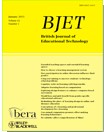- 简介: This paper reports findings of a pilot study that examined the pedagogical potential of Second Life (SL), a popular three-dimensional multi-user virtual environment (3-D MUVE) developed by the Linden Lab. The study is part of a 1-year research and development project titled ‘Modelling of Secondlife Environments’ (http://www.le.ac.uk/moose) funded by the UK Joint Information Systems Committee. The research question addressed in this paper is: how can learning activities that facilitate social presence and foster socialisation among distance learners for collaborative learning be developed in SL, a 3-D MUVE? The study was carried out at the University of Leicester (UoL) within an undergraduate module on Archaeological Theory, where two tutors and four students took part in four learning activities designed to take place in SL within the UoL Media Zoo island. The learning activities and training in SL were based on Salmon's five-stage model of online learning. Students’ engagement in SL was studied through interviews, observations and records of chat logs. The data analysis offers four key findings in relation to the nature and pattern of in-world ‘socialisation’ and its impact on real-world network building; the pattern of in-world ‘socialisation’ stage in Salmon's 5-stage model; perspectives on students’ progress in-world through the first stage of the model—‘access and motivation’—and perspectives on their entry into, and progress through, the second stage of the model—‘socialisation’—and the role of identity presented through avatars in the process of socialisation. The paper offers implications for research and practice in the light of these findings.
- 分类: 暂无分类
-
标签:
- 学习内容
- distance
- socialisation
- 超链接
- learning

